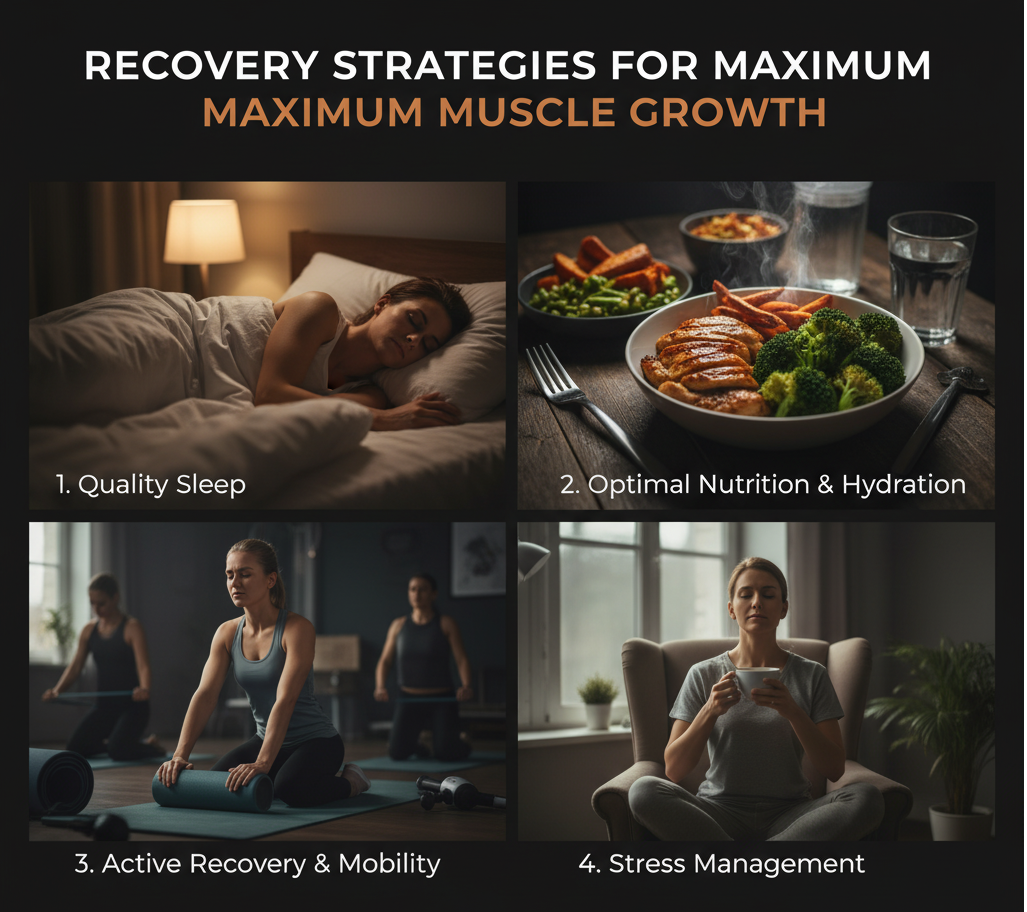Recovery Strategies for Maximum Muscle Growth
You hit the gym hard, you push your limits, and you feel that satisfying soreness. But here's the truth that many people miss: **muscles aren't built in the gym; they're built during recovery.** While lifting weights breaks down muscle fibers, it's during your downtime that your body repairs, rebuilds, and makes those muscles bigger and stronger than before. Neglect recovery, and you're essentially sabotaging all your hard work. Let's dive into the essential strategies I've found crucial for maximizing muscle growth and feeling your best.
I. Quality Sleep: The Ultimate Anabolic State
If there's one recovery strategy you absolutely cannot compromise on, it's sleep. Think of sleep as your body's natural "reset and rebuild" button. It's not just about resting; it's when your body releases the most **Growth Hormone (GH)** and **testosterone**, both vital for muscle repair and growth. Without adequate sleep (aim for 7-9 hours of quality, uninterrupted rest), your cortisol levels (a stress hormone) can rise, hindering muscle growth and fat loss.
My Personal Tip:
- Create a consistent sleep schedule, even on weekends.
- Optimize your bedroom: dark, cool, and quiet.
- Limit screen time before bed to help your mind wind down.
II. Optimal Nutrition & Hydration: Fueling the Rebuild
You can't build a house without bricks, and you can't build muscle without proper fuel. What you consume after your workouts and throughout the day directly impacts how quickly and effectively your muscles recover and grow.
Protein Intake
Protein is the building block of muscle. Aim for 1.6-2.2 grams of protein per kilogram of body weight daily. Distribute this intake throughout the day, including a good serving post-workout, when your muscles are primed for nutrient uptake.
Carbohydrates
Don't fear carbs! They replenish your muscle glycogen stores, which are depleted during intense training. Having sufficient glycogen helps with recovery and provides energy for your next workout. Prioritize complex carbs like whole grains, fruits, and vegetables.
Healthy Fats
Essential fats play a crucial role in hormone production, inflammation control, and overall health. Include sources like avocados, nuts, seeds, and fatty fish in your diet.
Hydration
Water is often overlooked but incredibly important. Muscle tissue is about 75% water. Dehydration can impair performance, slow recovery, and even affect nutrient transport. Drink plenty of water throughout the day, especially around your workouts.
III. Active Recovery & Mobility: Keep Things Moving
While rest is vital, sometimes a little movement can actually aid recovery more than complete stillness. This is where active recovery and mobility work come in.
Light Cardio
A gentle walk, a light cycle, or some easy swimming can help increase blood flow, which delivers nutrients to tired muscles and helps flush out metabolic waste products. This can be particularly beneficial on "off days" where you're feeling a bit stiff.
Stretching & Foam Rolling
Spending 10-15 minutes on dynamic stretches before a workout and static stretches after, along with foam rolling, can significantly improve flexibility, reduce muscle soreness, and prevent imbalances. I've found foam rolling especially effective for releasing tight spots in my quads, glutes, and back.
Yoga or Pilates
These practices combine flexibility, core strength, and breath work, all of which contribute to better body awareness, reduced stress, and enhanced recovery.
IV. Stress Management: The Hidden Killer of Gains
We often think of stress as purely mental, but chronic psychological stress has a very real, physical impact on your body. Elevated cortisol levels due to stress can break down muscle tissue, hinder growth, and even impact sleep and appetite.
Mindfulness & Meditation
Even short periods of mindfulness or meditation can help lower stress hormones and improve overall well-being, which directly supports recovery.
Hobbies & Downtime
Make time for activities you enjoy that take your mind off work and other stressors. Whether it's reading, spending time outdoors, or listening to music, truly unwinding is a powerful recovery tool.
Conclusion
Building muscle is a marathon, not a sprint. While crushing your workouts is a necessary component, it's during the often-neglected recovery phase that the real magic happens. By prioritizing quality sleep, optimizing your nutrition and hydration, incorporating active recovery, and managing your stress levels, you're not just resting; you're actively creating the optimal environment for maximum muscle growth and sustainable progress. Treat your recovery as seriously as your training, and you'll unlock your full potential!
